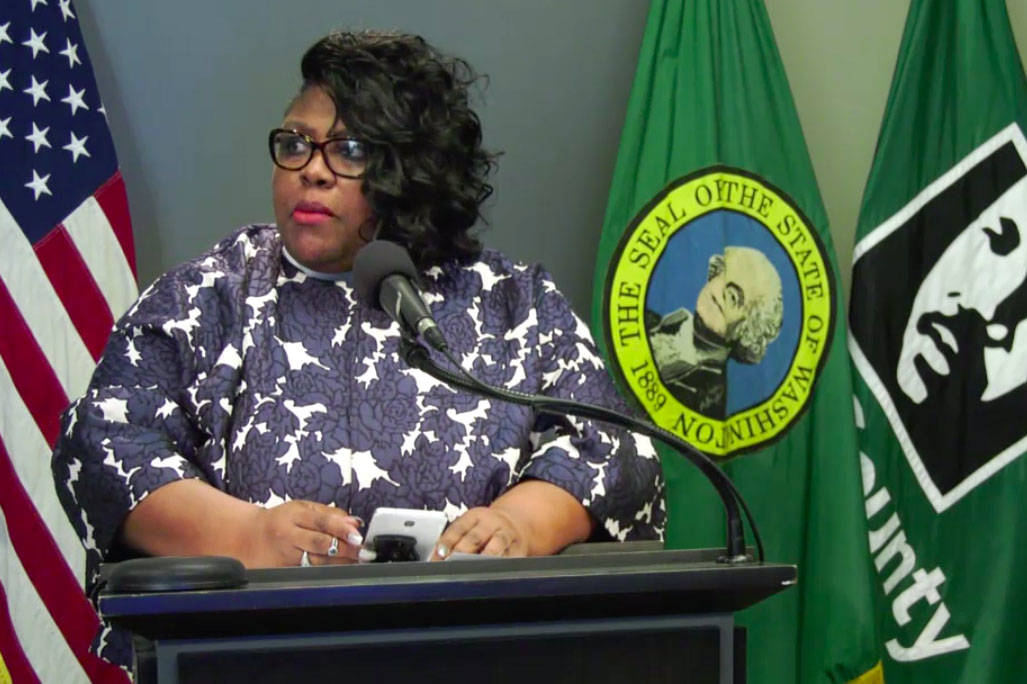King County called on its diverse faith community to inspire unity and safety in response to the COVID-19 pandemic.
In a press conference held the morning of March 20, leaders from various faith communities joined King County Executive Dow Constantine and Public Health – Seattle & King County director Patty Hayes to share their message to their communities and the county at large.
“In these difficult times, one place so many gather for comfort and for guidance are in places of worship, faith communities,” Constantine said in his opening remarks. “But these are communities of people, people who are vulnerable to this virus, and right now we have to join together to protect them in ways that are consistent with each faith tradition and that keep everyone healthy.”
Nawiishtunmi Conner, housing services director for the Chief Seattle Club, said that their community was looking to the past, learning from how their ancestors responded to previous pandemics.
“We try to get ahead of this with our own traditional medicine,” Conner said. “At the front door of Chief Seattle Club, we’re still open, we still want our community to know that we’re here for them, we’re worried about them and we want to help them and that they are a member of our family.”
She said she thought of the traditional teas that her grandmothers drank to fight illness, specifically because of how COVID-19 is a higher risk for the elderly. Conner said that members of her community were donating time, money and resources to help with health and homelessness.
“We’re connecting throughout the native communities and all other communities and trying to figure out how we can help [those without homes],” Conner said. “When I think about working with other cultures…other spiritualities, as a community it takes all of us coming together, all of us listening to each other.”
The press conference served as an opportunity for faith leaders to address how they were keeping themselves and others safe during the pandemic and to issue challenges to the community at all levels.
Imam Benjamin Shabazz, from the Islamic Center of Seattle, called on all to exhibit the golden rule and to practice both faith and caution at this time.
“We want everyone to understand that this too will pass, we don’t want anyone to panic or get bent out of shape,” Shabazz said.
He said changing the terminology from “social distancing” to “physical distancing” was one way to remind people of the need for their community, friends and family.
Rabbi Rachel Nussbaum of the Kavana Cooperative spoke to the challenges of the previous weeks and the predicted challenges ahead.
“During this time, I have repeatedly drawn upon the wisdom of my religious tradition in making decisions…Jewish tradition famously teaches that saving a life – pikuach nefesh in Hebrew – is like saving a world. Preserving life is so important that it takes precedent over all other commandments of our tradition,” Nussbaum said. “So, for instance, gathering for communal prayer, particularly on Shabbat, the sabbath, is an important Jewish practice, but it can and should be put aside when lives are on the line.”
She also highlighted Jewish teachings of the interconnected oneness of all life. She shared a story from Jewish tradition highlighting that “regardless of who we are, where we live, or what we believe, we are all in the same boat right now.”
“Judaism instructs us to rise above our individual concerns and act in accordance with the collective good,” she said.
Rev. Dr. Kelle Brown of the Plymouth United Church of Christ said that this was an opportunity to remember that the church is “not about brick and mortar but about a commitment to Jesus Christ.”
She called on individuals to consider how they cared for the elderly, the differently abled and disabled, the immunocompromised. She also called on the government to take actions to protect others in new ways.
“We’re asking our members and others…[to] advocate safety measures for those who are incarcerated in our state and in our city, to include considering release for them,” Brown said. “We’re asking for safe housing for those who are unhoused and ways to clean.”
Brown called for compassion for artists, musicians and other gig workers who may have lost income and for health care workers, grocery workers and others who are not able to take time off.
She also said this pandemic has revealed what can be done differently and better, by Christians and overall.
“Just to put a little levity in the room — we’re learning how many meetings can be emails,” Brown said. “It’s an amazing thing to understand that we’re reaching those alone in their homes, those that feel isolated…when this is over, we are going to be a new church, this is, in a way, a reformation and we are getting back to what is important as people of faith.”


